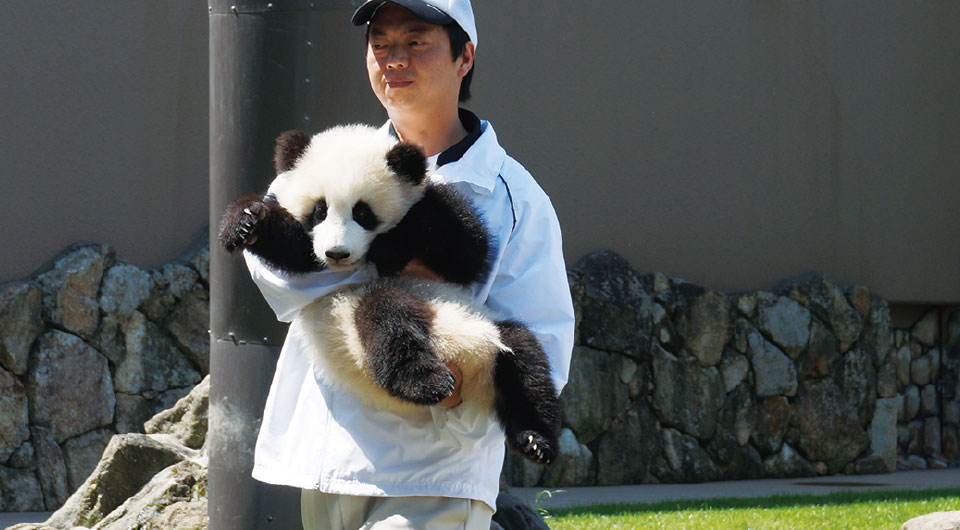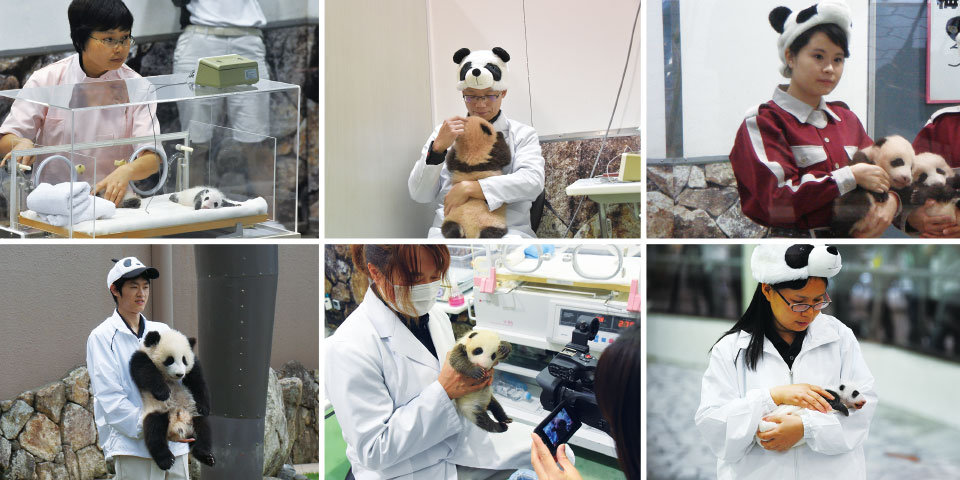

In building our relationship with them, we exchanged not only our breeding techniques,
Since 1994, a total of more than 70 staff members have been dispatched to the park from Chengdu Zoo and the Chengdu Research Base of Giant Panda Breeding to assist with breeding and research. In the beginning, the staff from China would stay throughout the year, and we would carry out our rearing management under their guidance. Starting in 2000, as we began full-scale breeding research, specialists in artificial insemination and newborn cub care also came to Japan, enabling our staff to learn from a great many experiences. From 2008 on, although experts from China only visit during estrus and birthing periods, by regularly sharing data on the health conditions and reproductive behavior of the pandas we build and maintain a relationship of mutual trust. In 2020, due to the COVID-19 pandemic, experts from China were unable to visit during the estrus and birthing periods, but thanks to the rearing and breeding techniques we have studied through our years of exchanges, our park staff was able to take charge and successfully manage the situation on their own. Our exchanges with the Chengdu base extending beyond breeding, we have formed close relationships through the active exchange of food and culture as well.
Staff from our park also paid visits to the Chengdu Research Base of Giant Panda Breeding for exchange and study. Park staff participated in a one-week visit to China in 1996 and a one-month visit in 2009. They primarily studied treatment and health examination techniques, including blood collection, ultrasound diagnosis, and methods of administering vaccinations for infectious diseases, and brought this knowledge back with them to care for the pandas in the park. Staff also had the chance to visit the site of Dujiangyan Panda Valley, which was then still under construction, and built a network of contacts with the staff of the Chengdu base, which went on to be of great help in future joint project for the conservation of giant pandas. In 2019 we devised and actually started a six-month long-term training program. The primary goal of this program was to deepen exchanges with the experts at the Chengdu base and build favorable connections for future breeding research. However, as a result of the COVID-19 pandemic, this program was cut short after just three months, and the staff was forced to return home. Thankfully, during training the staff was still able to acquire various knowledge on and skills in such areas as health management for elderly individuals and overall care for cubs.
Chinese Staff
| Period | Staff Member Names | |
|---|---|---|
| September 1994-September 1995 | Song Yunfang | Huang Xiangming |
| October 1995-October 1996 | Wang Qiang | Jiang Hua |
| November 1996-November 1997 | Yu Jianqiu | |
| November 1996-May 1997 | Wang Xingliang | |
| July 1997-July 1997 | Wang Qiang | |
| August 1997-November 1997 | Zhang Fuxiang | |
| November 1997-November 1998 | Fei Lisong | Wang Chengdong |
| November 1998-November 1999 | Niu Lili | Liu Xuanzhen |
| November 1999-May 2000 | Zhao Bo | Li Xuebing |
| May 2000-December 2000 | Ye Zhiyong | Wu Kongju |
| September 2000-December 2000 | Zuo Hong |
|
| December 2000-June 2001 | Yu Xingming | Li Mingxi |
| June 2001-December 2001 | Lan Jingchao | Lv Wenqi |
| November 2001-May 2002 | Zhong Shunlong | Hou Rong |
| December 2001-March 2002 | Wu Shangju | |
| May 2002-December 2002 | Yang Zhi | Song Yazhi |
| December 2002-June 2003 | Wang Lirong | Deng Jiabo |
| September 2003-December 2003 | Hou Guifang | |
| September 2003-March 2004 | Huang Xiangming | Yu Xingming |
| March 2004-September 2004 | Chen Hongwei | |
| March 2004-October 2004 | Lan Jingchao | |
| September 2004-June 2005 | Liu Yuliang | Xie Guirong |
| May 2005-June 2005 | Wang Jishan | |
| August 2005-January 2006 | Chen Weigang | |
| August 2005-November 2005 | Yang Kuixing | |
| December 2005-March 2006 | Duan Dongqiong | |
| April 2006-July 2006 | Lan Jingchao | |
| April 2006-October 2006 | He Xingyuan | Zheng Tao |
| August 2006-October 2006 | Liu Yuliang | |
| November 2006-May 2007 | Lv Wenqi | |
| December 2006-March 2007 | Chen Min | |
| December 2006-August 2007 | Qing Taiqiang | |
| April 2007-January 2008 | Lan Jingchao | |
| August 2007-February 2008 | Luo Li | |
| August 2007-May 2008 | Wu Shangju | |
| March 2008-May 2008 | Wang Qishan | |
| August 2008-November 2008 | Wang Shuqun | Yang Yamei |
| November 2008-February 2009 | Bai Meirong | Li Jia |
| March 2010-April 2010 | Zhang Liang | |
| August 2010-November 2010 | Zhang Ying | Duan Dongqiong |
| November 2010-February 2011 | Shi Bin | Liu Lei |
| March 2012-April 2012 | Wang Hairui | |
| August 2012-November 2012 | He Ping | Mei Yan |
| April 2014-May 2014 | Cai Zhigang | |
| November 2014-February 2015 | Xie Yi | Yang Ping |
| March 2015-June 2015 | Yang Kuixing | Qiu Dejian |
| March 2016-June 2016 | Cai Zhigang | |
| September 2016-December 2016 | Li Han | Huang He |
| April 2018-April 2018 | Cai Zhigang | |
| August 2018-October 2018 | Zhang Ying | Chen Xian |
| December 2020-February 2021 | Liu Hong | Xiong Jin |
Training History
| Period | Area of Training |
|---|---|
| May 15 - 22, 1996 | Artificial insemination training |
| June 20 - July 20, 2009 | Studied treatment, training techniques, and health management for elderly individuals |
| October 18, 2019 - January 21, 2020 | Training for health management for elderly individuals and overall care for cubs |

